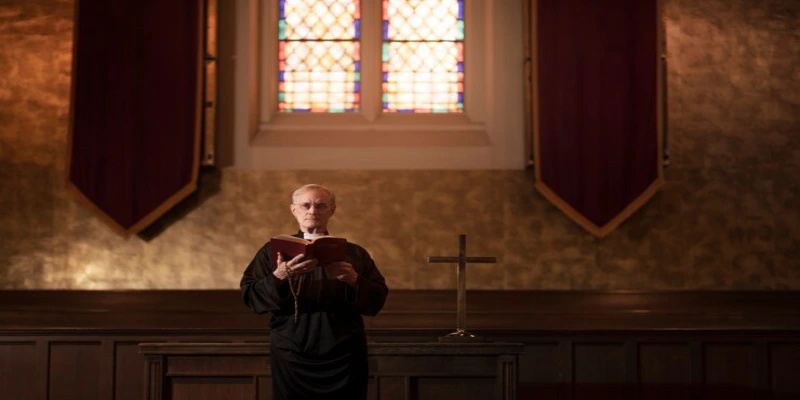How Spiritual Communion Prayer Can Nurture Your Soul
Updated: July 21, 2024
69
In the vast landscape of religious practices, Spiritual Communion Prayer stands out as a profound way to connect with the divine. Unlike physical communion, which involves consuming bread and wine, Spiritual Communion Prayer focuses on a deep, internal connection with God through prayer. This powerful practice transcends physical limitations, allowing believers to commune with the divine at any time, from any place.
By incorporating Spiritual Communion Prayer into your daily life, you can experience a more intimate relationship with God, cultivate a sense of inner peace, and find guidance in times of need. Through this transformative practice, you can unlock the doors to a deeper understanding of spiritual connection and nourishment.
History and Origin of Spiritual Communion
Early Christian Practices
The concept of Spiritual Communion has been introduced previously; it has roots in the early days of Christianity. Early Christians, especially those who couldn’t attend Mass regularly, would often engage in spiritual communion to maintain their connection with Christ. This practice allowed them to feel the presence of Christ in their daily lives, even when they couldn’t participate in the Eucharist physically.
Evolution Over Time
Over the centuries, the practice of spiritual communion has evolved, adapting to the needs of believers across different cultures and denominations. From the early Church Fathers to modern-day theologians, spiritual communion has been emphasized to nurture one’s faith and stay connected to the divine.

Understanding Spiritual Communion Prayer
What is a Spiritual Communion Prayer?
A Spiritual Communion Prayer is a heartfelt plea to God, expressing a desire to unite with Him spiritually when one cannot partake in the Eucharist. It is a way for believers to invite Christ into their hearts and minds, fostering a deep, personal relationship with Him.
Differences from Physical Communion
While physical communion involves tangible elements like bread and wine, spiritual communion is purely an internal, spiritual act. It doesn’t replace physical communion but is a supplementary practice, especially useful when attending Mass isn’t possible.
Significance of Spiritual Communion in Catholicism
Spiritual Communion Prayer Catholic
Spiritual communion is a special part of Catholicism. It is seen as a way to maintain a continuous relationship with Christ, even outside the regular Mass setting.
Historical Context
The Catholic Church has long recognized the value of spiritual communion. Saints like Thomas Aquinas and Alphonsus Liguori have written extensively about its benefits, highlighting its importance for believers unable to receive the Eucharist physically.
Modern-Day Practices
Today, spiritual communion is practiced by Catholics worldwide. With the advent of modern technology, many believers use online resources to guide their prayers, ensuring they remain connected to their faith community.
Components of a Spiritual Communion Prayer
Essential Elements
A typical spiritual communion prayer includes several key components:
- A desire for union with Christ
- An expression of love and devotion
- A request for His presence in one’s life
Variations in Different Denominations
While the core elements remain consistent, the wording and format of spiritual communion prayers can vary across Christian denominations. Each tradition brings its unique perspective, enriching the practice as a whole.
How to Perform a Spiritual Communion Prayer
- Find a quiet place where you won’t be disturbed.
- Begin by acknowledging God’s presence.
- Express your desire to unite with Christ spiritually.
- Recite a spiritual communion prayer.
- Spend a few moments in silent reflection, inviting Christ into your heart.
Tips for Effective Prayer
- Approach the prayer with a sincere heart.
- Focus on your love for Christ.
- Take your time; don’t rush the process.
Benefits of Spiritual Communion
Spiritual Growth
Engaging in spiritual communion every day can lead to significant spiritual growth. It deepens one’s relationship with God and enhances the overall spiritual experience.
Emotional Well-being
Spiritual communion can also contribute to emotional well-being. Connecting with the divine can bring peace and comfort, helping alleviate stress and anxiety.
Common Misconceptions about Spiritual Communion
Addressing Myths
One common misconception is that spiritual communion can replace physical communion. While it’s a valuable practice, it is meant to complement, not replace, the Eucharist.
Clarifying Doubts
Another myth is that spiritual communion is only for those who cannot attend Mass. In reality, anyone can practice it to enhance their spiritual life.
Personal Experiences with Spiritual Communion
Testimonies from Believers
Many believers have shared their personal experiences with spiritual communion. These testimonies often highlight its profound impact on their faith and daily lives.
Impact on Personal Faith
For many, spiritual communion has become a cornerstone of their spiritual journey, providing a constant source of strength and inspiration.
Pray for Spiritual Communion
Intentions Behind the Prayer
The primary intention behind a spiritual communion prayer is to seek a deeper connection with Christ. It expresses love, devotion, and a desire for spiritual unity.
How to Pray with Sincerity
To pray sincerely, focus on your genuine desire to connect with God. Allow your emotions to direct your words and deeds.

Prayers for Different Occasions
Prayer for Spiritual Communion During Mass
While attending Mass, believers can pray for spiritual communion to deepen their experience. This prayer is another way to invite Christ into their hearts during the service.
Daily Spiritual Communion Prayers
Incorporating spiritual communion prayers into daily routines can be incredibly beneficial. These prayers can be said in the morning, during quiet moments throughout the day, or before bed.
Role of Spiritual Communion During Crisis
Providing Comfort in Difficult Times
Spiritual communion can provide immense comfort during times of crisis. It allows believers to feel God’s presence and support, offering solace in challenging situations.
Case Studies
Historical and contemporary case studies show that spiritual communion has been a source of strength for many during personal and collective crises, such as wars, natural disasters, and pandemics.
Resources for Learning More about Spiritual Communion
Books
Many books delve into spiritual communion, offering insights and guidance for those looking to deepen their understanding.
Online Resources
Numerous websites and online communities provide valuable resources, including prayer guides, articles, and forums for discussion.
How to Teach Spiritual Communion to Others
Teaching Children
Introducing children to the concept of spiritual communion can be a rewarding experience. Use simple language and relatable analogies to help them understand the practice.
Guiding New Believers
Provide clear instructions and supportive materials to help new believers incorporate spiritual communion into their faith journey.
Conclusion
Spiritual communion is a beautiful and meaningful practice that deeply connects believers with the divine. Understanding its history, significance, and how to perform it can significantly enhance one’s spiritual life. Whether you’re a seasoned believer or new to the practice, spiritual communion offers a powerful way to invite Christ into your heart and life.
FAQs
What is a spiritual communion prayer?
A spiritual communion prayer is a heartfelt plea to God expressing a desire to unite with Him spiritually when one cannot physically partake in the Eucharist.
How often can one perform a spiritual communion prayer?
There is no limit on how often one can perform a spiritual communion prayer. It can be done daily, multiple times a day, or whenever one feels the need to connect with God.
Can spiritual communion replace physical communion?
No, spiritual communion is meant to complement, not replace, physical communion. It is especially useful when physical participation in the Eucharist is not possible.
What are the most common prayers for spiritual communion?
Common prayers include those written by saints like Thomas Aquinas and Alphonsus Liguori, and modern adaptations are available in prayer books and online.
How can I improve my spiritual communion practice?
To improve your spiritual communion practice, approach it with sincerity, focus on your love for Christ, and make it a regular part of your daily routine.
Please Write Your Comments